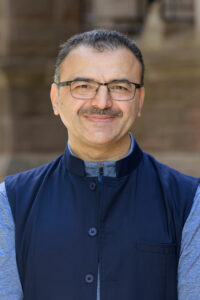Trinity College named a new director of Muslim life to connect, engage, motivate, and inspire the College’s diverse Muslim population.

“A central tenet of Osman’s work is the concept of being a compassionate companion, a role he refers to as the ‘virtuous companion,’ inspired by the profound teachings of the Quran and hadith,” said Halley. “He emphasizes empathy, ethical conduct, and unwavering support in his spiritual guidance, drawing from Islamic traditions to foster meaningful connections in diverse environments.”
At Trinity, Simsek is based within the Office of Spiritual and Religious Life, supporting and developing interfaith bridges. He will collaborate with the Office of Diversity, Equity, and Inclusion; the Office of Student and Community Life; and the Office of Community Service and Civic Engagement to support the College’s commitment to welcoming all people and nurturing relationships among people of different religious views. Simsek also will serve as a liaison to the Muslim Student Association leaders in the development of programming.
Halley noted that Simsek strongly believes in the necessity of interfaith dialogue, guided by the Quranic principle of “te’âruf”—the idea of mutual recognition and understanding among diverse peoples. He added that Simsek believes that diversity is a manifestation of God’s will and wisdom and that differences should be seen as a source of enrichment.
With this perspective, said Halley, Simsek is dedicated not only to building a vibrant Muslim community at Trinity, but also to serving as a “virtuous companion” to all students, faculty, and staff, fostering spiritual growth, intercultural understanding, and mutual respect across the campus.
Simsek has a traditional madrasah education—equivalent to a Ph.D. in theology and Islamic sciences—along with a master’s degree in Islamic chaplaincy and experience in clinical pastoral education. The combination, said Halley, enables Simsek to offer a holistic approach to spiritual caregiving, deeply rooted in both classical Islamic knowledge and contemporary pastoral care practices.
Simsek’s native language is Turkish, and his proficiency in Ottoman Turkish, Arabic, and English enriches his perspective and enhances his ability to communicate with a wide range of individuals, Halley said. In addition to publishing six books, Simsek has edited approximately 20 others and has produced hundreds of educational and religious videos.
